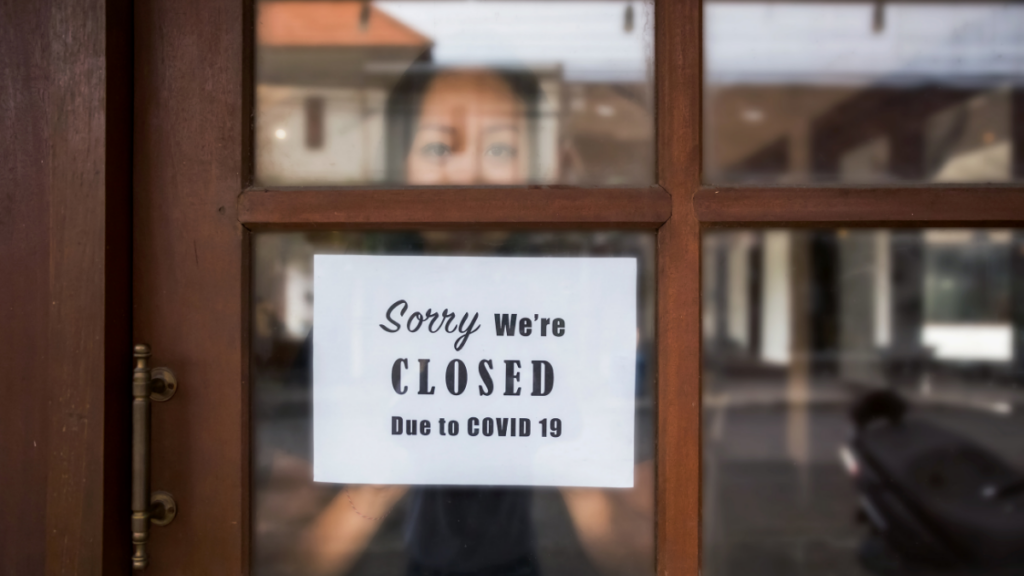
Business Support is a Critical Resource for SMEs following COVID Lockdown
Remember life before COVID?
Do you remember life before COVID? It probably feels like a long distant memory of more stable days and greater freedoms, when stories of ‘BirdFlu’, ‘SARS’, ‘Ebola’, ‘Hand, Foot & Mouth Disease’ and ‘Swine Flu’ would grace our Smart Phone and TV news screens as we went about our daily lives, never really impacting us here in Europe and the UK.
A chance to reflect for business owners?
Now, as we approach the end of the second year of COVID mania and media sensations regarding ‘Coronavirus’, ‘Lockdown Announcements’ and ‘Business Support’ through ‘Furlough Schemes’, is it time to reflect on how lockdown has changed our lives? Again and again, we ask how did lockdown affect small businesses? What should businesses do after lockdown? Will there be another lockdown announcement? What business support will be available?

How Lockdown affected Business Owners?
Businesses in the UK have not only faced repeated lockdowns forcing many to close, but we’re also seeing inflation running at its highest for many years, driving up the cost of materials and labour, and we really don’t know what is going to happen over the next 12 months regarding the coronavirus pandemic, economic health and spiralling debt levels.
Businesses are being told to help their staff work from home wherever they can, encourage people to get fully vaccinated, get booster vaccines, limit close contact with people, implement social distancing, let fresh air into your workplaces (which is a great idea as long as it isn’t too cold), and to wear a face-covering when possible.
To add pressure to all of this, business owners are facing increasing challenges regarding the emotional wellbeing and mental health of their workforce. SME leaders in particular tend to have the least support available to them to support staff who feel worried, feel anxious, have mental health concerns, or who are less able to cope with lockdown restrictions due to the nature and size of their business.
Business owners need to provide compassion to their employees for the loss of loved ones or family requiring hospitalisation, and for employees needing support for long covid symptoms, all the while not really having a yardstick of any kind to know how honest or loyal employees are really being.
From Furlough to Fear for Business Owners
Business owners initially cheered when the government announced the furlough scheme and provided debt funding to prop them up, and most business leaders assumed that things would be settling after a year or so at the most.
We are now soon to enter the third year of the COVID pandemic and the mounting concerns for SME owners are also centred around their rising debt levels, facing a higher risk of financial exposure than ever due to spiralling material costs and a shortage of labour available to bring home their potential revenue, knowing that further COVID restrictions could finish them off for good.
Acting the part for your employees
In addition to the financial pressures thanks to COVID and government regulations, as employers you are expected to turn up looking positive and strong for your employees.
Offering advice and understanding for their mental health, support for their anxiety and sympathy for their positive COVID test after positive test requiring them to self isolate.
Along with making sure you have hawk-like reactions for anyone displaying symptoms or showing symptoms, and ensuring your own mental health is in good shape, whilst wondering if coronavirus and national lockdowns will ever end.

COVID impacts businesses differently
One thing that has been absolutely clear as a result of the coronavirus pandemic is that the impact is certainly not the same for all companies. Not only do different sizes of businesses cope in different ways, but the services the business provides and the manner in which they provide them makes for a wide variation across the sector, in particular SMEs.
We were all used to seeing the growing dominance of Amazon pre-covid, and they were certainly in the right place for when it hit. Internet shopping became a must for many regardless of their inclination regarding shopping this way, and Amazon has been able to grow and dominate during this time.
The hospitality sector has found that if people are either not allowed or too frightened to eat and drink out then their businesses are not viable. But what about all of the businesses that don’t get much of a mention in the media?
The UK’s Business Makeup
Our nation is made up of a wide variety of companies from manufacturing, R&D, engineering, financial services, legal services, construction, tourism, technology and so many more. This provides a level of resilience for hard times, but how are we distributed in terms of sizes?
How many businesses are there in the UK?
According to the UK government report on ‘business statistics’ published in 2020, there are almost 6 million private companies in the UK, up from 3.5 million in 2000, however, the proportion that employs people has fallen from 32% in 2000 to 24% in 2020, representing a huge rise in self-employment.
How many self employed business owners are there?
Of the 6 million businesses, 4.5 million have no employees, meaning these are generally self-employed. Considering they make up 76% of business in the UK, they contribute 7% of turnover generated in the private sector.
How many UK businesses are less than 9 employees?
Approximately 1.4 million have 1-9 employees and extracting the data in the report we can approximate that they provide around 14% of the turnover generated and makeup 23% of UK businesses.
How many UK businesses have 10-49 employees?
There are around 200,000 businesses in the UK that employ 10-49 people, making 15% of the turnover generated by private companies, whilst representing 4% of the total number of businesses.
How many Medium & Large business?
There are 36,000 medium (50-249 employees) and 8,000 large employers (over 250) in the UK. They generate 16% and 48% of the turnover nationally, meaning in reality that 8,000 companies out of 6 million generate 48% of the turnover in the sector. The large sector employs 39% of people and medium employ 16%. The 8,000 large companies will involve many day to day names you recognise and you probably know several people that work for them.
So what does that mean for UK Business Support?
These numbers may be very interesting to you or even not very interesting at all, but what does it mean? Different businesses have different needs, and the people they serve are very different.
Is there a Coronavirus grant funding to support businesses in the UK?
The good news for many UK companies during lockdown was the launching or availability of multiple business support initiatives by the government. We’ve had the furlough scheme, Kickstarter scheme, business rates relief, VAT breaks, the recovery loan scheme, bounce back loans, ‘eat out to help out’ to name but a few.
The funding schemes provided through channels such as the British Business Bank, high street banks and their associated partners have helped a multitude of businesses stave off collapse due to the impact of COVID19.
Business Support of varying natures can be accessed through growth hubs like the Leicestershire Business Growth Hub, with business advisers available to listen to your challenges and signpost you to either available funding, support, resources and more. If you are wondering about more support, read on to the bottom of this article to find more resources.
Different Business owner approaches to lockdown measures
The nature of businesses and the opinions of their respective leaders have had a high impact on the measures taken during the national and local lockdowns of 2020-2021. We’ve seen a large scale moving of office workers to a work from home culture and the subsequent explosion in the use of video meetings and video networking events, many with some really positive outcomes. How you can operate also had some dependency on whether you were deemed as an ‘essential worker’ or ‘essential service’.
Many companies rely on their staff being co-located to have efficient operations, especially in fast-paced environments where different teams tend to shout across to each other throughout the day to carry out their jobs effectively. There is also the reality that a lot of low skilled roles have a tenuous but undeniable link to work integrity.
Managing people remotely compared to sitting in a room with a team is also very different and has forced large scale changes to the work approach.

Some business owners shut down their operations very quickly and often unnecessarily at the beginning of the pandemic, whilst others hung on too long before facing the reality. The furlough scheme was used very differently, with many businesses taking the opportunity to dodge furlough and move straight to redundancy knowing few questions will be asked.
Others used the furlough schemes even when they had the work and revenue for their staff and used the scheme as an opportunity to protect or even enhance their bottom line (EBIT or profit). How many times have you phoned an organisation and heard them using COVID as an excuse for providing you terrible customer service? Sometimes this was genuine, but it’s also been used to increase profits at the expense of customers.
Is working from home really the answer?
We’ve gone from having to think about your support bubble, social contact and social distancing to facing a reality for many in having very little human contact day to day causing a wide variety of mental wellbeing issues. How to reduce pressure on the NHS? We are told we have to work from home.
We also have to consider what age group people are in when we ask this question. It is a very different prospect for a healthy 25 year old to attend the workplace than for a 60 year with health complications. The medical reasons for people having a different approach are self-explanatory, but as an employer, it makes it a very difficult prospect to deal with.
Working from home comes with many potential benefits. People spend less time travelling to work and have more time in the day, people can get out and walk during the day in their local surroundings improving their physical health, there has been a widespread uptake in people getting pets and enjoying the outdoors.
People talk about work-life balance now in a way they would never have dared before, taking care of themselves, talking about their mental health. But it’s not all as rosy as people like to often make out.
How can working from home have a negative impact?
Training and developing staff can be more challenging remotely, and creating a team environment of people working together remotely can be really difficult. Ensuring staff get enough social contact during the day whilst also ensuring people are working when they are meant to be working (and not slacking off) are all issues faced by business owners.
The net result is that there really isn’t a single ‘one size fits all’ approach to this problem, and working from home on a temporary basis is in no way similar to making it a long term measure. Of course, no one talks about what facilities people have in their homes.
Some have the fortune to have a home office, garden room or nice environment, but for many they are sharing a small house with a number of other people and working from their bed all day (particularly young people), making for a very negative potential outcome on mental wellbeing for these groups, not to mention the physical health aspects of using a laptop sitting on a bed day in day out.
How can we move forwards with Business Support?
For many companies, the business support they need can be grouped into categories as outlined below, and taking action in each of these areas will make a real difference:
Revenue: Can I sell my products and services effectively?
Revenue for a business has become a challenge for many new reasons, from not having enough customers to having plenty of potential customers and no way to service their needs. This can be from staff shortages or a lack of material availability as we’ve seen in the construction industry.
Cash flow: Can I pay everyone’s wages whilst revenues fall?
For many businesses, the winter COVID makes people afraid to go out. There is no support from the government financially whilst they put measures in place effectively scaring people from going to the hairdressers, eating out with friends or having their Christmas party with their work. With more than half of businesses expected to not have a Christmas party for their staff this year, it is grim reading for many hospitality outlets that would otherwise be very busy.
Mental health and wellbeing
Keeping up with the demands of UK expectations on employers with respect to mental health, COVID support, understanding the need to self-isolate, getting your head around different restrictions from week to week is enough to deter many people from wanting to employ at all, and may be enough for many small business owners to give up altogether.
Digital Transformation
Many companies have moved forwards tremendously with digital transformation during the COVID pandemic, and a wide variety of funding has been made available to support these initiatives through local enterprise partnerships (LEPs) and growth hubs, but many companies simply have not done enough to cope with the shift towards being a digital online business.
For business owners that aren’t technically advanced there is a real risk of finding a partner to assist with transformation to later find they have not served you well but relieved you of a lot of your money.
Outsourcing
Business owners are often very adverse to reaching out for help from other companies. If you really know what you are doing in a particular area it can be great to train and mentor staff internally, but so many business leaders hurt their company by refusing to seek help from outside agencies and consultants without having a deep knowledge of a particular area.
One example of this is in Digital Marketing, where owners seldom know how to develop their online business to improve the chances of being found, not realising that most website designers have little knowledge in this area, and thinking marketing is about creating leaflets and fliers.
Digital Marketing is one example of a business function that most SMEs benefit significantly from outsourcing due to the owners lack of knowledge in this area. For more on Digital Marketing refer to CREATIVE in TiME.
Networking
Speaking to other like-minded business leaders and owners can be a really helpful way of staying positive, finding out different ways to solve your challenges, meet new people, get access to vital support that you were not aware even existed, understand the best way to implement workplace rules, get more information about other business support initiatives, to name a few.
But where are these? Some private companies have successfully created networking events, whilst there are many others that are paid and require a lot of commitment and input from their members, which many do not have the time or desire to be part of.
Awareness
One of the biggest challenges for business owners is that they are simply not AWARE of the business support available to them either as a result of lockdown announcements, COVID and the pandemic.
If you speak to many SME owners they are so busy fighting day to day to win and deliver their offering to customers that they do not find the time to research the kind of funding and support on offer.
If you are a business owner or leader, reach out to your local growth hub and LEP (local enterprise partnership) to find what is available for you!
More information
If you would like more information on these topics, feel free to reach out to the author, Fred Warner, who is a Business Champion at the Leicestershire Business Growth Hub or find more information on the Business Growth Hub website.
About the Author Fred Warner
Fred Warner is a Business Mentor, Adviser and Consultant to a wide variety of SMEs both small and large. Fred has a passion for helping small businesses grow, plan, create strategies, and deliver. In addition, Fred also runs a Digital Marketing Agency called CREATIVE in TiME Ltd with his partner. Fred has 20+ years in leadership, sales & marketing, technology & products, transformation & business change in industries from F1, Aerospace, Rail, Electronics, Software to Beauty & Leisure.


